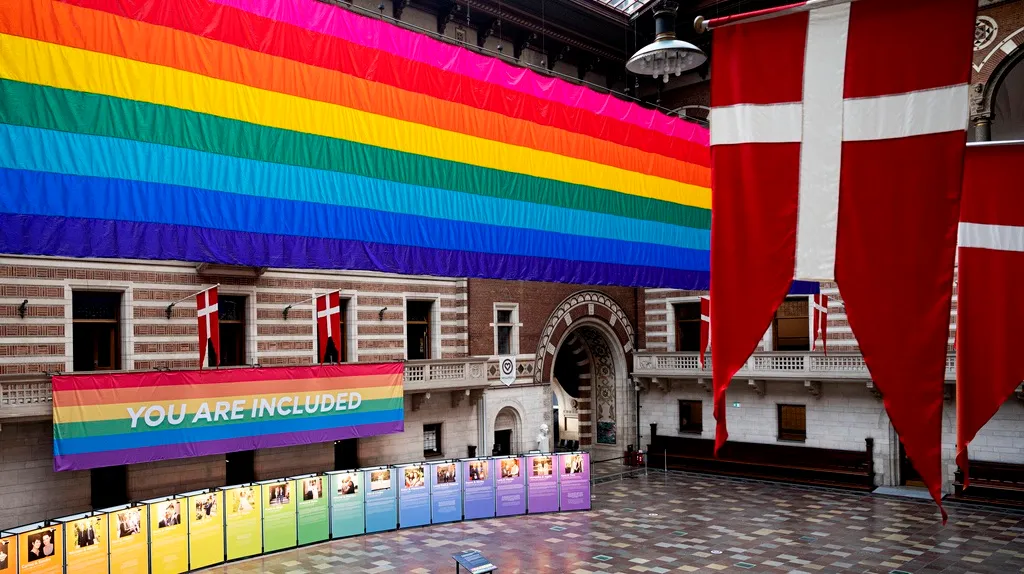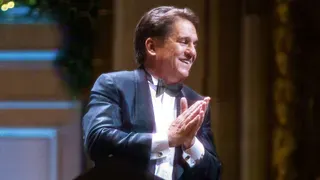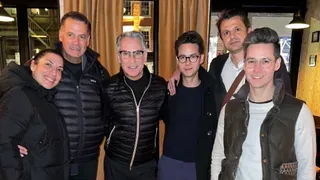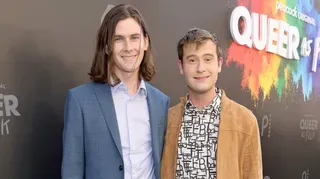August 20, 2023
On 'AJLT' – What's With Anthony's Old School Definition of Bottoming?
Robert Nesti READ TIME: 6 MIN.
One the many annoying ongoing themes from "And Just Like That..." is the divide between the generations. Pretty much anyone over 35, which includes Carrie, Charlotte, Miranda, Anthony, and the bevy of new characters dropped into their lives for diversity's sake, are sensible, mature, and sophisticated, while virtually anyone under 35 is rude, uncultured and self-absorbed. It is not as if any of these younger characters have major roles; instead, they act as the butt of jokes or objects of their elders' abuse. Sorry, Charlotte, it is not a good look to berate a boutique worker because she cannot accommodate your bougie needs.
But one younger character has emerged to be the calmest and wisest of them all: Giuseppe (Sebastiano Pigazzi), the hunky Italian poet who arrived as a punchline due to his enormous dick showing through the spandex outfit he wore to promote Anthony's bread company, Hot Fellas, on "The Drew Barrymore Show." The world got a look at Giuseppe, business boomed at Hot Fellas, and the poet (first seen selling poems for a dollar in a bookstore) was hired. All is well until Giuseppe steals a kiss, breaking Anthony's business boundaries. The sensible Giuseppe quits and the pair began to date – reluctantly on the part of the cautious Anthony, who is unsure of Giuseppe's motives. But Giuseppe remains winningly congenial as he puts up with Anthony's suspicions, such as thinking the younger man is looking for a green card in a "90-Day Fiancé" scenario. Instead of being offended, Giuseppe laughs and tells Anthony that his mother is American and lives in Buffalo, giving him dual citizenship. This exchange happens at a party at Charlotte's apartment, and the pair sneak off to an empty room to have sex.
Anthony, as played by Mario Cantone, is old gay personified: A New Yorker with an opinion on everything and a voice that makes sure everyone in the room knows it. He and Stanford Blatch (the late Willie Garrison) were pretty much the only gay ongoing characters in "Sex and the City," and it was surprising to see them drop their "frenemies" pose and marry in the gayest way possible – at a wedding at which Liza Minnelli sang "Single Ladies" – in the second "Sex and the City" movie. But the marriage didn't work out, and in the first season of "And Just Like That," Stanford abandoned New York for Japan to work for his only client. In reality, Garrison died in 2021 at the age of 57 after filming three episodes of the "SITC" reboot. This left the creatives to come up with a way for the character of Stanford to exit the series, which was awkwardly dropped in this week's episode with Stanford still living, but putting the material world behind him by becoming a Shinto monk.
Anthony brings to the show the voice of the no-nonsense New Yorker, much like the Thelma Ritter character from an old Hollywood comedy. He personifies the middle-aged gay New Yorker who was sexually active, but not sexually liberated; queerly cynical, but not queer enlightened; and prone to dismissive quips. Take, for instance, the moment earlier this season when Charlotte overheard her 12-year-old child Rock say they sometimes "don't feel like a girl." Helicopter mom Charlotte ran to Anthony, who told her she should ignore it and made "a predictable joke about being a fairy, and ... that's it," writes Max Gross in Slate. "The scene ends. The idea of Rock even questioning their gender is met with Anthony's comical comparison to a kid wanting to be Tinkerbell or a dog – that is, either something fictional or inhuman."
Gross, a NYC comic and writer, and the foremost scholar on "And Just Like That," adds that the show has no intention of representing them – in their case, a young person struggling with coming out as non-binary. Instead, they write, "the people the show aims to represent are the well-meaning but uninformed 50-something, straight, cisgender white women, and how they react to and talk about us behind closed doors. This isn't a show sculpted for me and my generation, in tune with our sensibilities and hoping to help us navigate the mystery that is gender; it's for my mom's exact demographic of people who still struggle to see past their deeply-ingrained binary understanding of it."
That struggle is also seen in Anthony's relationship with Giuseppe. Giuseppe is a find. Played by Sebastiano Pigazzi, he's a sexy hunk grounded in a healthy space. Why he's attracted to Anthony is something of a riddle – not just because of the age difference, but the simple divide in their personalities and sexual practices. On the season's penultimate episode, Anthony and Giuseppe are seen finishing sex. That Anthony is the top is apparent, but when Giuseppe suggests that their relationship should be vers, Anthony abruptly shuts the idea down with, "Because it's not who I am." In other words, he's never bottomed. "You're the bottom, I'm not."
Giuseppe counters sweetly, "I'm bottom. I'm top. I'm in love. With you. I want you to feel something wonderful." He promises to be gentle when his 9" is mentioned, then suggests that Anthony's reluctance is about something else. "I don't understand what the issue is here, but it's a big one, and not my big one."
He then asks why, with all the sex Anthony has had over the years, he's not been fucked.
"Because I am not the woman, okay?" Anthony responds defensively.
But when Giuseppi says, "So I'm the woman?," Anthony counters no, adding: "Gay men of my generation see things differently. The roles were more defined."
"Why does someone have to be the woman?" asks Giuseppi. "Why can't we be two men, each one getting fucked on and off?"
Which leads to another of Anthony's dismissals: "You kids today with the versatility."
"But why would you be afraid of more love?" counters Giuseppi.
The interplay was refreshing, if only because it introduced a younger voice who was not brittle or satirized, but intelligent, open, and genuinely interested in pursuing a serious relationship with the anally-virgin Anthony. But Anthony's response was peculiar. What generation is Anthony from? And why he is speaking for an entire generation? His comments are presumptuous and largely inaccurate. By the 1970s, talk of gay men's sexual role play along M/F lines was already out of date, redefined by by a generation of sexually liberated men who didn't see their sexual roles as mimicking heterosexuals.
That Anthony is approaching 60 suggests he landed in Manhattan in the mid-1980s and has experienced the enormous change in sexuality that has occurred since then. To hear him talk of gay sex in these outdated ways was disheartening, if only because this would have been a great opportunity for the writers to suggest that his reluctance to bottom is rooted in his fear of a virus that likely took the lives of many of his friends. A statement like that would have resonated far more with the gay men of Anthony's generation, and not sounded like a parish priest explaining gay sex to a parishioner. But, no; again, "And Just Like That" takes the easy way out by giving voice to an outdated, pre-Stonewall meme played by a character rooted in "The Boys in the Band" playbook. But a show as glib as this could never seriously look at issues with any degree of complexity, which is fine. We are there for the fashion and the wealth – in the wonderful comments section of the New York Times weekly recap, someone described the show as "Wealth Porn," which it clearly is. But bravo, Giuseppe! The freshest voice in the show's addictive awfulness.
Robert Nesti can be reached at [email protected].







